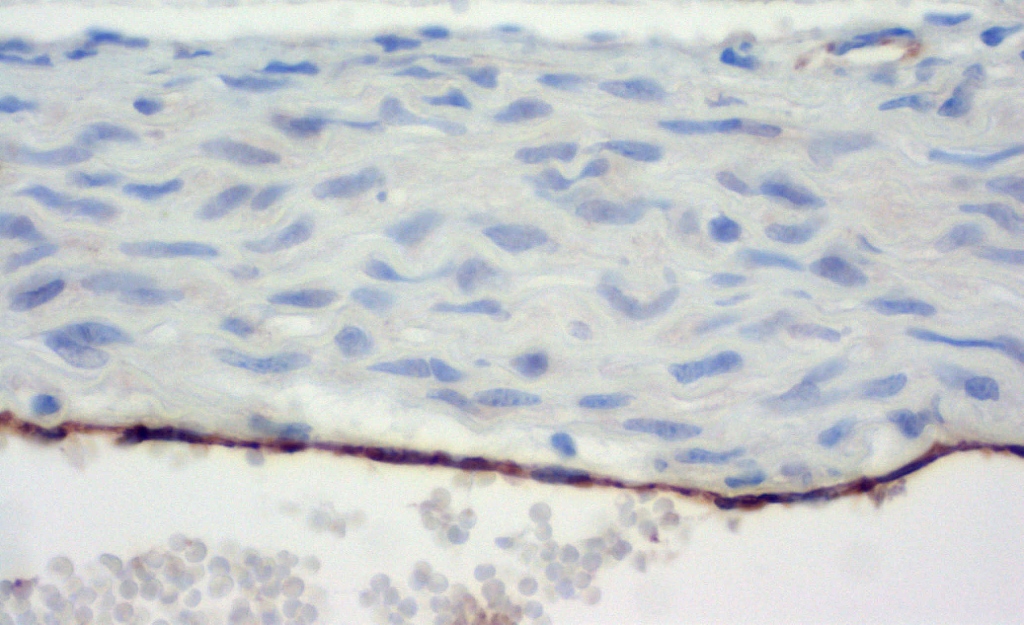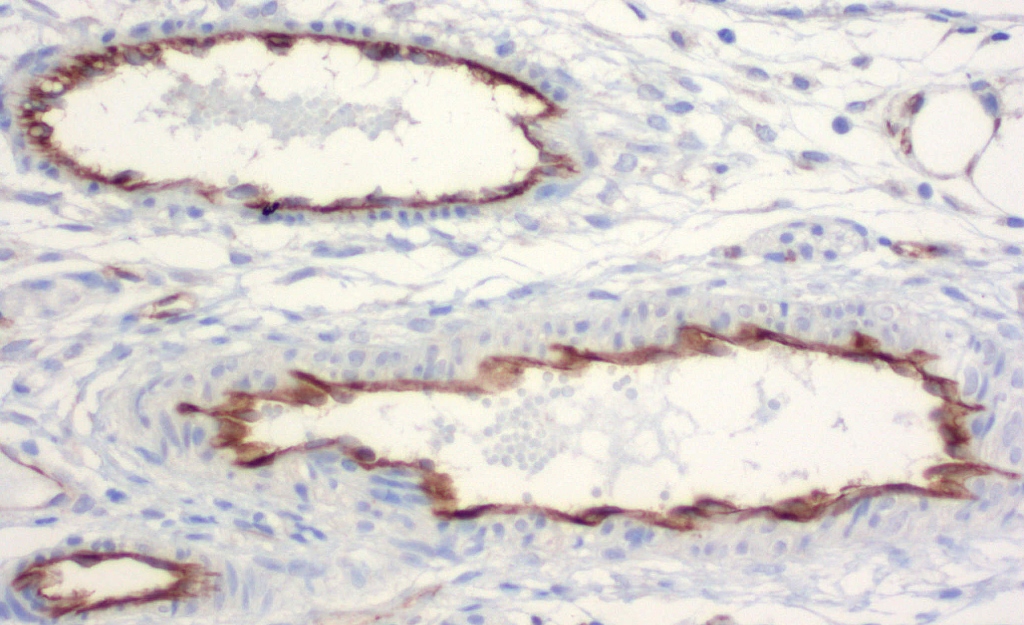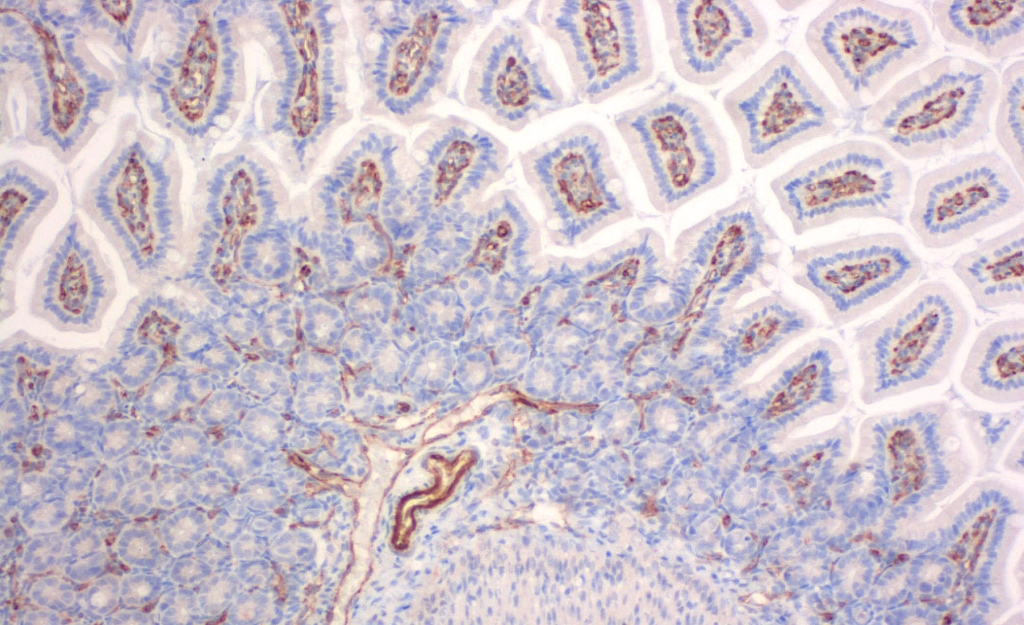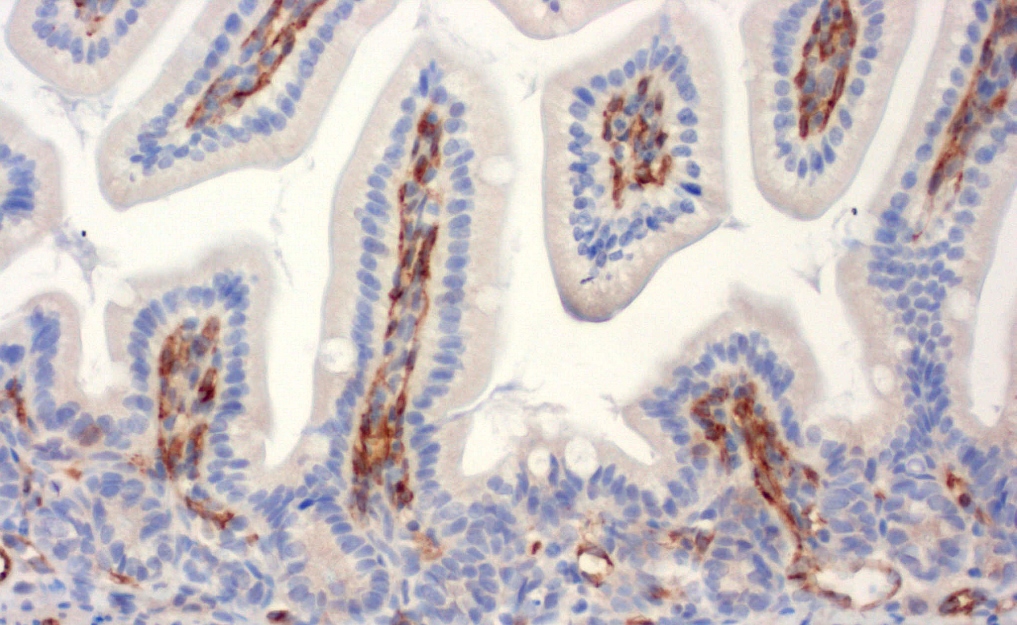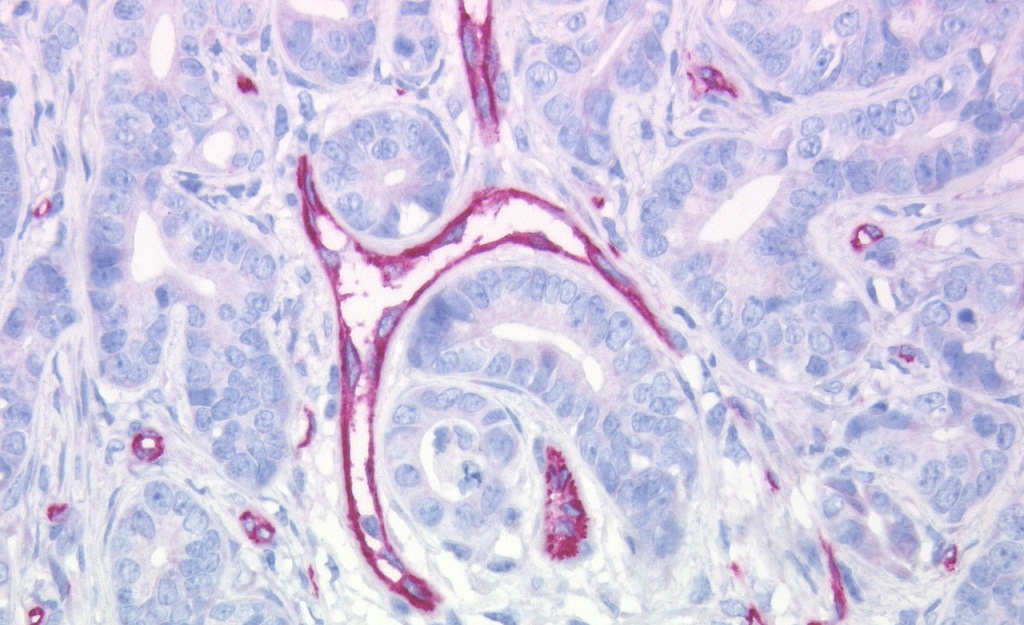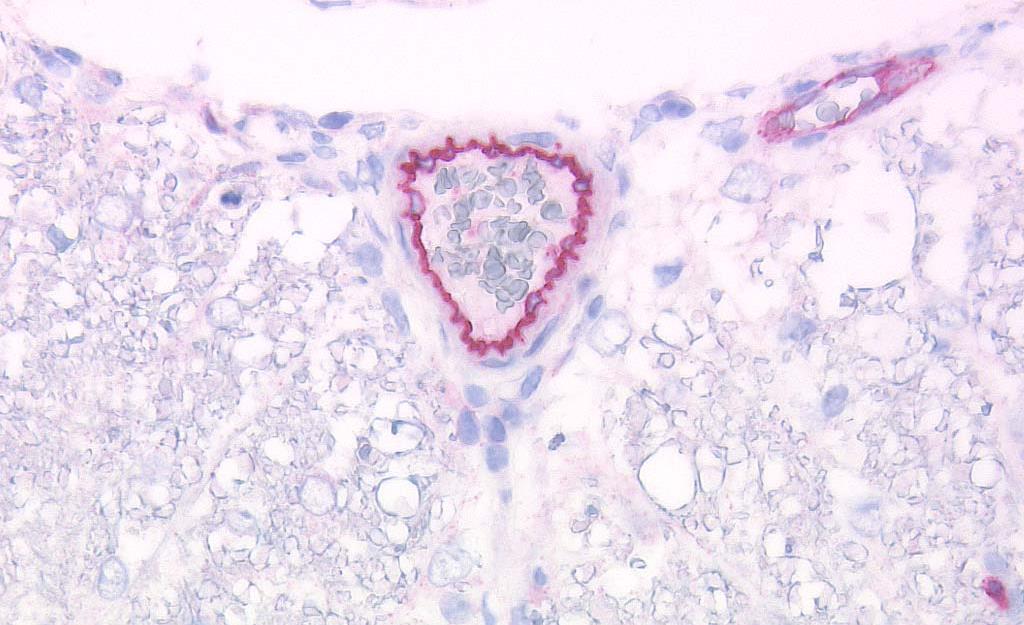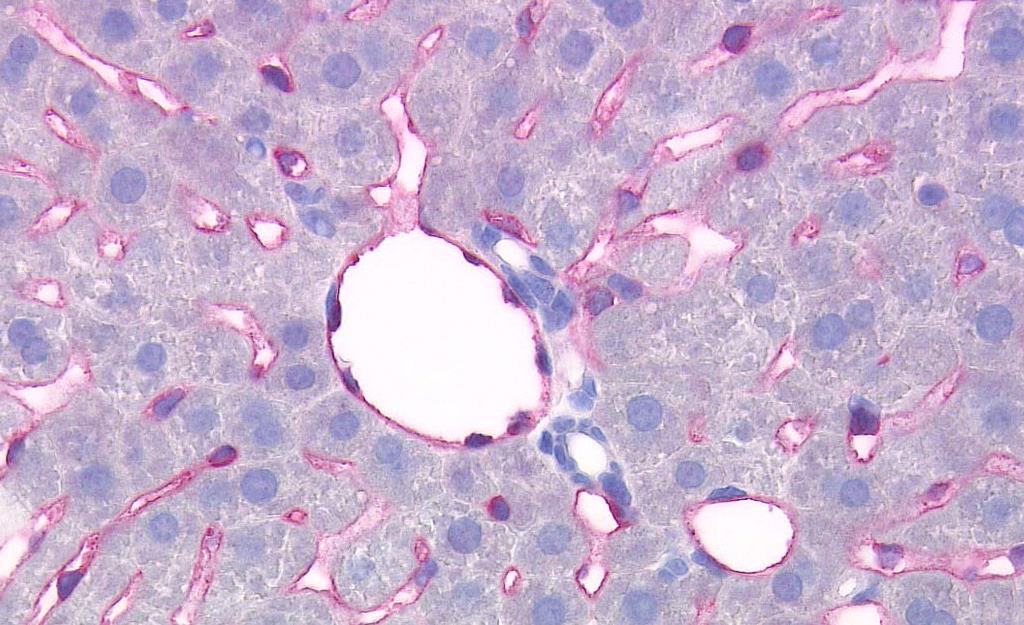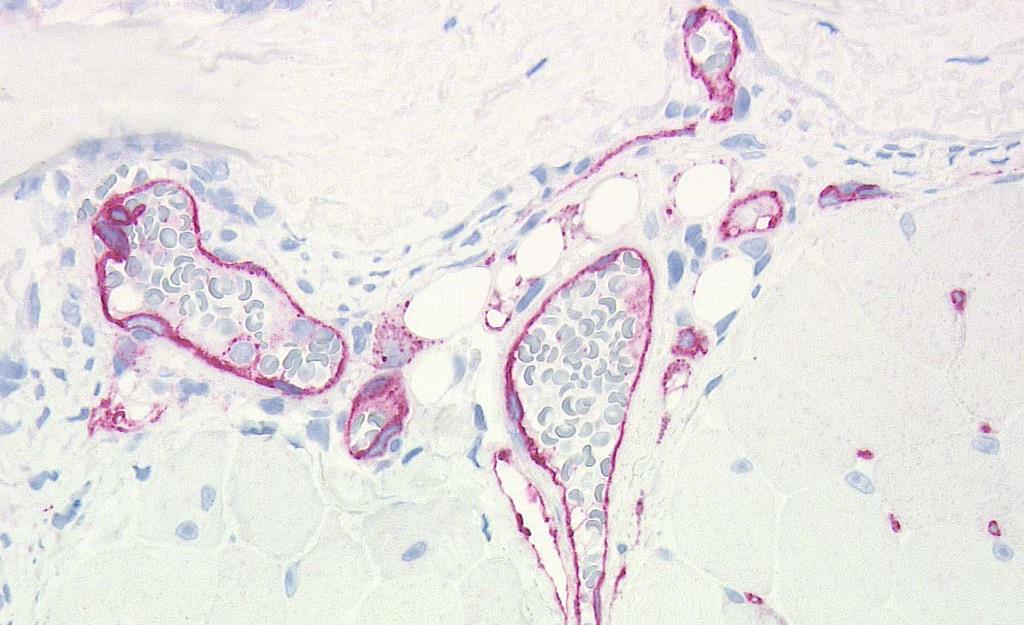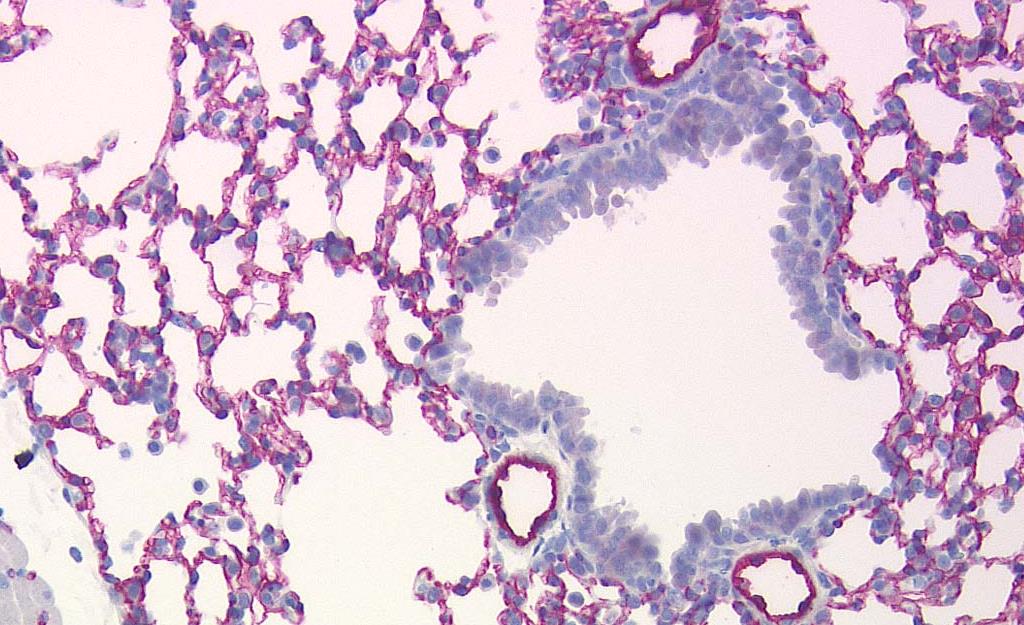 Clone SZ31 is a worldwide unique tool for endotheliel cell detection and analysis of angiogenesis in mouse tissue. Overcome the mouse CD31 staining challlenge. Get confident in your msCD31 stain on routine formalin-fixed mouse tissue and browse more than 350 scientific publications on CiteAb.
Clone SZ31 is a worldwide unique tool for endotheliel cell detection and analysis of angiogenesis in mouse tissue. Overcome the mouse CD31 staining challlenge. Get confident in your msCD31 stain on routine formalin-fixed mouse tissue and browse more than 350 scientific publications on CiteAb.
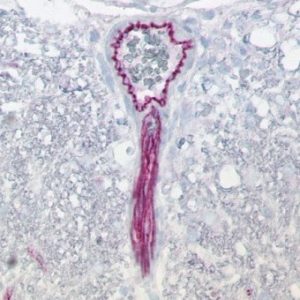
CD31 is the most important marker for endothelial cells and for studies of (neo-) angiogenesis, e.g. in tumors. Antibody clone SZ31 (#DIA-310) is the only antibody which reacts specifically with murine CD31 in routine formalin-fixed paraffin-embedded tissue sections. Clone SZ31 shows no cross-reactivity to human CD31. This is extremly important for research and preclinical studies of angiogenesis in mouse models, e.g. human tumor xenografts. Since its release 2010 clone SZ31 from dianova has been published in numerous scientific journals by different laboratories and is considered as the „goldstandard“ for studies of angiogenesis in mouse model systems.
Key Features of anti mouse CD31 Antibody – Clone SZ31:
- works on normal formalin-fixed and paraffin-embedded mouse tissues with standard HIER pretreatment (Citrate buffer pH 6.0)
- no cross-reaction with human – ideal for xenograft mice
- specific staining of large and small blood vessels
- stains endothelial cell subtypes of vertebrate vasculogenesis, endothelial progenitor cells as well as circulating endothelial cells and stem cell-derived vascular endothelial cells
Immunohistochemistry of mouse CD31 (PECAM-1) in formalin-fixed paraffin-embedded tissue sections.
The antibody clone SZ31 reacts specifically with endothelial cells in vessels and capillaries of:
Function and role of endothelial cell marker CD31
CD31 / PECAM-1 – Expression and Protein function
CD31, also known as PECAM-1 (Platelet Endothelial Cell Adhesion Molecule-1) is expressed constitutively on the surface of embryonic and adult endothelial cells. CD31 is major constituent of the endothelial cell intercellular junctions. It plays a key role in the transendothelial leukocyte migration (leukocyte transmigration), the integrin activation and is significantly involved in angiogenesis. It is also expressed on cell surfaces of monocytes, neutrophils, platelets and certain T-cell subsets. It has been detected on bone marrow-derived hematopoetic stem cells and embryonic stem cells.
Cluster of Differentiation 31 (CD31) is a 130kDa integral membrane glycoprotein and as a member of the immunoglobulin superfamily involved in the mediation of cell-to-cell adhesion. CD31-mediated endothelial cell-cell interactions play a major role in angiogenesis.
CD31 / PECAM-1 – Marker for Angiogenesis in Mouse Model Systems
Studies have shown CD31 to be a superior marker in human angiogenesis, which reportedly predicts tumor recurrence. But Pathophysiological studies of CD31 in murine model systems previously had limitations because standard formalin-fixed sections were excluded. The clone SZ31 (Anti-CD31) eliminates these restrictions by allowing high quality immunohistochemical analysis of standard formalin-fixed paraffin sections in mice.
CD31 / PECAM-1 – Why is CD31 important in pre-clinical studies?
Research of endothelial cell changes in mouse paraffin tissues has contributed significantly to our knowledge of the pathophysiology of endothelial cells and the mode of action of potential drugs and therapies on endothelial cell involvement in many diseases.
Pre-clinical studies in mice are particularly suitable in ordert to investigate new drug candidates and pathophysiological changes of endothelial cells. The importance of the endothelial system for the entire organism goes far beyond that of a mere line between the intra- and the extravascular system. It involves numerous physiological processes including the regulation of the exchange of substances between blood and tissue, the regulation of vascular tone and vasodilation, the maintenance of the hemostatic balance, blood coagulation, the mediation of platelet and leukocyte interaction and the angiogenesis.
Unsurprisingly, changes in endothelial cells and the vasculature play a central role in the pathogenesis of many of the most common serious human diseases, such as
- Cancer
- Coronary artery disease
- Atherosclerosis
- Stroke
- Kidney disease, diabetic nephropathy
Thus research on drugs that target endothelium-associated processes, receptors, cytokines and growth hormones make up an important part of drug research. Particularly noteworthy are angiogenesis inhibitors, as tumor growth and the process of metastasis are crucially dependent on the formation of new blood vessels in the tumor. In many tumors, CD31 expression correlates with the microvessel density and is directly related to the tumor mass. In regenerative medicine the development of treatments for therapeutic angiogenesis play an important role in cardiovascular disease. In view of the pandemic with SARS-CoV-2 (COVID-19), the investigation of pathophysiological mechanisms of endothelial cell damage in viral infections gains prominent importance. Endothelial cell infection and COVID-19-induced endothelitis are suspected to be the cornerstone of organ dysfunction in severe SARS-CoV- 2 infection.
The quality of CD31 immunohistochemistry in mouse tissue sections is of crucial importance for the investigation of pathological endothelial cell changes in research and preclinical studies. With more than 200 publications, Dianova’s CD31 antibody clone SZ31 is the benchmark for endothelial cell staining in mouse paraffin sections.

